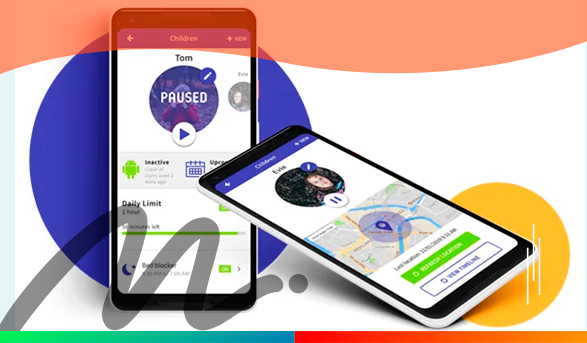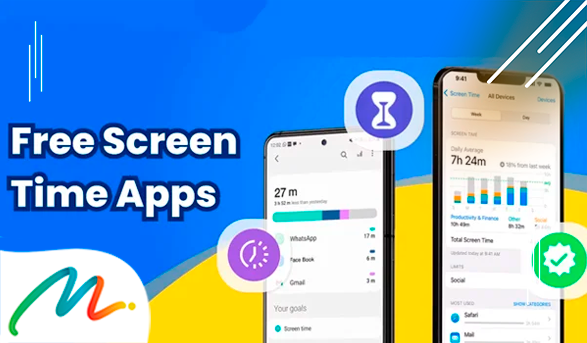
In today’s digital age, parental control apps have become indispensable tools for parents seeking to manage their children’s smartphone usage and ensure their online safety. Screen Time is one such app that aims to provide these essential features. In this review, we will explore its strengths and weaknesses, its feature set, pricing, and how it stacks up against other options on the market.
The Pros and Cons of Screen Time:
Pros:
- User-Friendly Design: Screen Time boasts an intuitive and user-friendly design, making it accessible even to parents who may not be tech-savvy. Its interface is thoughtfully designed for simplicity, ensuring that parents can navigate its features with ease.
- Task Reward System: One standout feature of Screen Time is its task reward system. This innovative system allows parents to incentivize positive behavior by assigning tasks to their children. Completing these tasks earns children additional device time, promoting responsible device usage.
Cons:
- Additional Charges for Location Tracking and Web Filtering: While Screen Time offers valuable features, it’s worth noting that some essential functionalities, such as location tracking and web filtering, come with additional charges. This may pose a drawback for parents seeking comprehensive control without extra costs.
- Lack of Text or Call Monitoring: Screen Time does not provide the ability to monitor text messages and phone calls, which can be a significant limitation for parents concerned about their children’s communication on their devices.
- Limited Functionality on iOS: One notable drawback of Screen Time is its limited functionality on iOS devices. Compared to its Android counterpart, the iOS version lacks certain features, such as app management and web filtering, making it less versatile for Apple users.
Screen Time: Features and Functionality
Screen Time follows the freemium business model, allowing users to download and use the app for free, providing access to basic monitoring features. However, the complete range of parental controls is unlocked through a subscription.
The app offers a $6.99 monthly subscription that grants access to premium features for an unlimited number of users and devices. Discounts are available for users who opt for six months or a year in advance. New users can also enjoy a 7-day free trial of all premium features without the need for payment information.
Previously, there was a $4.99 monthly plan that excluded geolocation and web filtering. However, this service tier has been discontinued, as these features are considered essential for parental control.
Screen Time’s Free Solution: Screen Time’s free offering primarily focuses on monitoring a child’s device activity without offering control features. It is limited to one device per child. While the Android app provides more comprehensive monitoring, it still lacks the ability to restrict access based on time or content.
For parents seeking a free option, Kaspersky Safe Kids’ free tier is a more feature-rich alternative, though it falls short of paid options.
Premium Plan Features: Screen Time’s Premium plan unlocks essential parental control features, including:
- Daily Limits: Parents can set daily limits for device usage, ensuring that children do not spend excessive time on their devices.
- Daily Schedules: Schedule device usage based on specific times of the day, helping establish healthy routines.
- Task System: The unique task system allows parents to assign tasks to their children, each with a designated “minute value.” Completing tasks earns children additional device time.
- Pause/Unpause: Parents can instantly pause or unpause device usage with a single button, providing immediate control over screen time.
- App Management (Android Only): Android users gain access to app management features, including an app blocker and the ability to view a child’s web history and search history.
Screen Time: Location Tracking
Screen Time introduced location tracking in August 2018. Initially, this feature required an additional subscription, but it has since been included in the Premium plan, albeit with a corresponding price increase. Location tracking provides real-time or last known location information for a child’s device, depending on connectivity.
The feature has proven reliable, and additional functionalities like location history and geofencing were added in July 2019, further justifying the subscription upcharge. These enhancements contribute to the app’s appeal for parents concerned about their child’s whereabouts.
Screen Time: Pause/Unpause
For parents seeking immediate control over their children’s device usage, Screen Time offers a convenient pause/unpause feature. Activating the pause button on a child’s profile will block all non-native apps on iOS and all apps on Android.
Upon clicking the pause symbol, parents are prompted to choose whether to pause all their children’s devices or only one child’s devices. Additionally, they can add a message to inform the child of the pause reason, ensuring transparency in parental control actions.
Screen Time: Tasks
One standout feature that sets Screen Time apart is its task system. Parents can create tasks through the parental portal, assigning each task a “minute value” that children can earn as additional device time.
The app provides sample tasks to help parents get started, such as “Do something kind,” “Finish your homework,” and “Tidy your room.” However, parents have the flexibility to create customized tasks with specific time values and frequencies (daily, weekly, or monthly).
Children can mark tasks as complete within the Screen Time app on their device, even providing photo verification for task completion. Parents can then verify and grant additional device time as a reward. This unique task system encourages positive behavior and responsible device usage.
Screen Time: Activity Logs

Activity logs are predominantly relevant for Android users, offering in-depth usage data unavailable on iOS. On iOS, users can only view overall device usage time, which, while useful, lacks granularity.
Android users benefit from a more comprehensive view of app usage, with access to the last 50 apps used and their respective durations. Daily usage totals can be drilled down to view individual app usage sessions.
Additionally, Screen Time provides web history and search history, presenting users with recent website visits and performed searches. Although newer Android versions (Marshmallow and later) do not support search history functionality, searches still appear in the web history, preserving valuable information.
Screen Time Review: Conclusion
In conclusion, Screen Time offers several commendable features, including its user-friendly design, task reward system, and convenient pause/unpause functionality. However, the app falls short on iOS compared to its Android counterpart, making it challenging to recommend for Apple users.
Parents seeking comprehensive parental control on iOS may find better alternatives like OurPact (currently available for Android only) and Net Nanny, which offer robust functionality at competitive prices. Screen Time’s upcharges for location tracking and web filtering may also deter some users.
Despite its limitations, Screen Time remains a valuable tool for parents looking to strike a balance between responsible device usage and a child’s digital experience.
Don’t hesitate, unveil the remarkable list of Apps picked by our tech experts right away, and transition to the next level in your success challenge.





 Mastering the Art of Getting Apple Products for Free: Your Pathway to Premium Gadgets Without the Price Tag <p class='sec-title' style='line-height: normal; font-weight: normal;font-size: 16px !important; text-align: left;margin-top: 8px;margin-bottom: 0px !important;'>Unlock the secrets to acquiring Apple products for free and elevate your tech game without breaking the bank!</p>
Mastering the Art of Getting Apple Products for Free: Your Pathway to Premium Gadgets Without the Price Tag <p class='sec-title' style='line-height: normal; font-weight: normal;font-size: 16px !important; text-align: left;margin-top: 8px;margin-bottom: 0px !important;'>Unlock the secrets to acquiring Apple products for free and elevate your tech game without breaking the bank!</p>  Discover the Ultimate Rewards Adventure: Shein, Shopee, Amazon, and Temu Await! <p class='sec-title' style='line-height: normal; font-weight: normal;font-size: 16px !important; text-align: left;margin-top: 8px;margin-bottom: 0px !important;'>Embark on an exhilarating journey of rewards and surprises with the vibrant world of Shein, Shopee, Amazon, and Temu!</p>
Discover the Ultimate Rewards Adventure: Shein, Shopee, Amazon, and Temu Await! <p class='sec-title' style='line-height: normal; font-weight: normal;font-size: 16px !important; text-align: left;margin-top: 8px;margin-bottom: 0px !important;'>Embark on an exhilarating journey of rewards and surprises with the vibrant world of Shein, Shopee, Amazon, and Temu!</p>  Discover the 5 relationship apps that turn virtual connections into reality <p class='sec-title' style='line-height: normal; font-weight: normal;font-size: 16px !important; text-align: left;margin-top: 8px;margin-bottom: 0px !important;'>This is the ultimate guide to the 5 best dating apps to connect souls online!</p>
Discover the 5 relationship apps that turn virtual connections into reality <p class='sec-title' style='line-height: normal; font-weight: normal;font-size: 16px !important; text-align: left;margin-top: 8px;margin-bottom: 0px !important;'>This is the ultimate guide to the 5 best dating apps to connect souls online!</p>